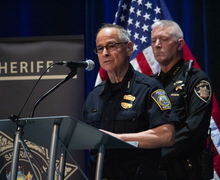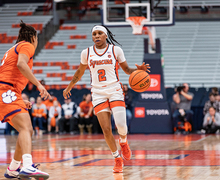Musicians should be allowed to share political opinions
Our political system is messy. Like a freshmen boy’s dorm room, or the kitchen sink after one of my roommates cooks. And with everyone and their dog constantly yelling — including, but not limited to, our candidates — it’s hard to figure out who exactly to listen to. It seems like everyone gets a say, even musicians.
The White Stripes have started selling “Icky Trump” t-shirts, and Adele asked The Donald to stop playing her songs at his rallies. Novelist Dave Eggers even organized “30 Days, 30 Songs,” a movement literally releasing an anti-Trump song every day to ensure he doesn’t get elected. Some musicians also included in the campaign are Death Cab for Cutie, Franz Ferdinand and Josh Ritter.
And it’s great. It’s more than fine to use your platform to advocate your views; democracy allows people to argue, speak, and debate about the politics of our nation. By why do certain musicians have the political pull to bash politicians, and others do not?
I’m talking about the Dixie Chicks, of course, and their famous 2003 comments about being “ashamed” that President Bush came from their home state of Texas. These comments didn’t kill their career. They wrote a great sixth album, but the massive amount of endless hate they received from their incredibly tame statement eventually caused them to stop touring. The death threats and the boycotts didn’t help either. Essentially, their audience gave them the freedom to speak their mind but didn’t support them for it, sending them hate letters and refusing to buy their albums. Good times.
In the 1960s, music was the anthem to the civil rights movement. It wasn’t until pushback in the 1970s that musicians began to be less outspoken, due to external backlash and pressure. Once again, we get back to the pesky fact that musicians have to make money. If enough people hate what they’re doing, their records don’t sell. When political climates shifted, musicians stopped writing as many government-condemning anthems.
It doesn’t excuse the death threats though. There is nothing wrong with musicians sharing their political views — even if you don’t agree with them, it doesn’t give you the right to threaten them. The fact of the matter is democracy gives everyone a right to an opinion, even if it’s against your politics.
Some people see public figures like musicians as duty bound to speak out against matters of public policy, as if their fame and notoriety should force them to talk. Others want to separate art and artist, preferring them to only discuss what is relevant to their genre. But it’s up to them to decide who or what they want to advocate for — politics or not.
As for the listener’s duty, we don’t have buy their albums. We don’t have to go to their shows. No one is forcing us to support them. But dually, choice shouldn’t involve threats. A listener doesn’t have the right to threaten a musician for saying something they don’t agree with.
And hey, the Dixie Chicks are touring again. Maybe I’ll go see them.
Emera Riley is a junior magazine journalism major. Her column appears weekly in Pulp. You can email her at [email protected].
Published on October 18, 2016 at 9:32 pm





